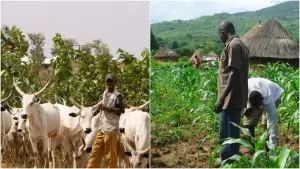The quiet farming settlement of Yelewata in Benue State was thrown into mourning after suspected armed herdsmen attacked the community on June 13-14, 2025, killing over 300 residents in what survivors describe as the deadliest massacre in Benue's recent history.
Residents woke to gunfire, burning homes, and the horrifying cries of children being hacked, shot, or burnt alive. By dawn on Saturday, hundreds of homes had been reduced to ashes, and the once-thriving community was silenced by grief.
Planned and Coordinated Attack
According to Franc Utoo, a lawyer and native of Yelewata who lost 33 members of his extended family in the attack, residents had received intelligence about the planned invasion and had relocated to various locations including schools, market squares, and churches within Yelewata town.
"This thing is straightforward. Those guys have started plotting the attack before that day," Utoo told BenriNews. "We were aware of the plot that they might invade our town from Obi, Doma or Keana LGAs in Nasarawa State through Giza or Kadarko. So we got intelligence about what was going to happen."
The attackers reportedly divided themselves into groups, targeting areas with high population concentrations, including the RCM Primary School, churches, and the Yelewata New Market, where many displaced persons had sought refuge.
Rising Tensions Between Farmers and Herders
The attack came amid rising tensions between local Benue farmers and herders operating in the region. Weeks earlier, traditional rulers across Tiv and Idoma lands had issued a directive asking all herders to vacate their lands by the end of May due to recurring violence and destruction of farmlands.
Similar attacks had occurred in other communities like Edikwu-Ankpali in Apa and the Tyoshin community in Naka, Gwer East LGA, where scores of persons were also killed.
Victims and Survivors
Among the victims was Pharmacist Matthew Iormba, who had just returned home after completing his housemanship in Kano, only to be burnt alive during the attack. Tsegba Lucy lost her mother and five siblings when their house was set ablaze by the assailants.
"My beloved mum and beautiful sisters. Go well till we meet again. I love you, but God loves you more. I can't stop crying. Kai, God, you do me strong thing," Lucy mourned.
Another survivor, a local footballer identified as Agande, had traveled to Makurdi for a match. Upon his return, he discovered that both his parents and 10 family members had been burnt beyond recognition.
"It was like a war. In my 57 years on earth, I've never witnessed this. I escaped with my third son. My wife and other children were not so lucky. My world ended that Friday night," said Elder Amos, his voice trembling as he recounted the horrific experience.
Controversy Over Death Toll
There has been significant controversy over the actual death toll. While Governor Hyacinth Alia announced that only 59 people died, local sources and survivors insist that over 300 lives were lost.
"We lost over 300 people. Children were burnt to ashes. In some places, entire families were wiped out. If anyone tells you it's 59, they're lying. A family here lost over 40 members alone," said Samson, a youth leader in Daudu.
The Federal Government, through the Secretary to the Government of the Federation, George Akume, admitted that over 200 people had died, though even this figure is believed to understate the scale of destruction.
Government Response Criticized
The government's response to the massacre has been heavily criticized. Governor Alia reportedly waited over 48 hours to comment on the killings, sparking public outrage.
"We expected him to come here. To mourn with us. Even if he had nothing to offer, he could at least show sympathy. But he stayed silent and then downplayed our pain," lamented Tever Japhet, a community leader.
President Bola Tinubu, through his media adviser Bayo Onanuga, described the killings as "reprisal attacks," a comment that shocked many, including residents and activists.
Utoo criticized the presidential statement, saying: "From the beginning of that statement to the end, there was nowhere he mentioned the two most important things: arresting the perpetrators and bringing them to justice. Nowhere. He was concentrating on reconciliation. He was addressing us as warring parties. Which war are we fighting?"
International Reactions
The horror in Yelewata has sparked national and international outrage. Pope Leo XIV described the attack as a "terrible massacre," calling for justice, protection, and peace for rural Christian communities in Benue and across Nigeria.
"I am praying for security and peace in Nigeria, especially for those affected by violence in Benue," the Pope said in a Sunday address from Rome.
As Yelewata continues to bury its dead and search for missing family members, the question remains: Will the community ever recover from this carnage?
Follow BenriNews on Facebook | Twitter | LinkedIn | WhatsApp | Telegram













